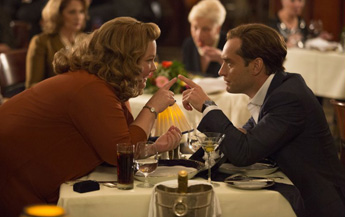The 400-Word Review: Spy
By Sean Collier
June 9, 2015
BoxOfficeProphets.com

One-note cameos in This is 40 and The Hangover Part III underused her considerable comedic talent; last year’s St. Vincent showed her range, but underplayed her humor. Identity Thief was simply underwritten, and Tammy treated her like a goofy, bumbling prop (odd, in that it was written by McCarthy and her husband, Ben Falcone.)
Even The Heat, her second collaboration with Bridesmaids director Paul Feig, was a bit too lazy to really work. McCarthy’s great skill is finding depth, truth and relatability in outlandish characters; most writers get the outlandish part, but not the depth.
In Spy, though, she shines again — and, for the first time, proves that she can effortlessly carry a big-budget comedy in a leading role. Written and directed by Feig, Spy takes the well-worn tropes of the espionage spoof and attacks them from a fresh angle, relying on timing and character rather than slapstick and farce.
Susan Cooper (McCarthy) is a CIA agent relegated to desk duty, as she monitors and directs the exploits of Bond-esque agent Bradley Fine (Jude Law) from headquarters. When Fine accidentally offs a weapons kingpin, though, the dead baddie’s daughter Rayna Boyanov (Rose Byrne) eliminates the super spy and reveals that she knows the identities of all the CIA’s top field agents.
Since Susan remains anonymous, she’s called into action over the objections of guns-blazing operative Rick Ford (Jason Statham, expertly parodying the rest of his career). Susan has all the skills to be an effective spy, but a constant inability to get anyone else — from the villains to her superiors — to take her seriously stands in the way.
In a near-genius script, Feig manages to make each character both satirical and serious. Susan is the visual opposite of the cinematic spy, but her challenges are not pratfalls; her struggles are human, not parodic. Boyanov skewers the cold sociopath role while engaging in some meta-commentary about gender typing in action films, and Ford exposes the inherent absurdity of every action star — because he’s insecure.
Feig is to be commended (and we’re now free to get unabashedly pumped for his upcoming “Ghostbusters” entry). But the story is McCarthy, eclipsing nearly all of her previous work and proving she’s exactly as talented — and funny — as previously promised.
My Rating: 8/10
Sean Collier is the Associate Editor of Pittsburgh Magazine and a member of the Broadcast Film Critics Association. Read more from Sean at pittsburghmagazine.com/afterdark